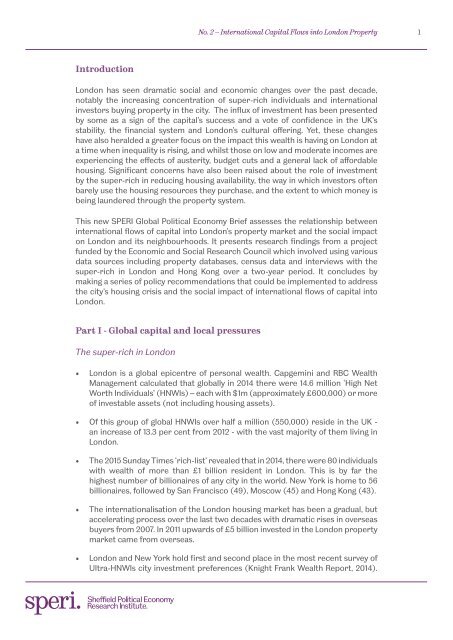International Capital Flows into London Property
Global-Brief-2-International-Capital-Flows-into-London-Property
Global-Brief-2-International-Capital-Flows-into-London-Property
You also want an ePaper? Increase the reach of your titles
YUMPU automatically turns print PDFs into web optimized ePapers that Google loves.
No. 2 – <strong>International</strong> <strong>Capital</strong> <strong>Flows</strong> <strong>into</strong> <strong>London</strong> <strong>Property</strong><br />
1<br />
Introduction<br />
<strong>London</strong> has seen dramatic social and economic changes over the past decade,<br />
notably the increasing concentration of super-rich individuals and international<br />
investors buying property in the city. The influx of investment has been presented<br />
by some as a sign of the capital’s success and a vote of confidence in the UK’s<br />
stability, the financial system and <strong>London</strong>’s cultural offering. Yet, these changes<br />
have also heralded a greater focus on the impact this wealth is having on <strong>London</strong> at<br />
a time when inequality is rising, and whilst those on low and moderate incomes are<br />
experiencing the effects of austerity, budget cuts and a general lack of affordable<br />
housing. Significant concerns have also been raised about the role of investment<br />
by the super-rich in reducing housing availability, the way in which investors often<br />
barely use the housing resources they purchase, and the extent to which money is<br />
being laundered through the property system.<br />
This new SPERI Global Political Economy Brief assesses the relationship between<br />
international flows of capital <strong>into</strong> <strong>London</strong>’s property market and the social impact<br />
on <strong>London</strong> and its neighbourhoods. It presents research findings from a project<br />
funded by the Economic and Social Research Council which involved using various<br />
data sources including property databases, census data and interviews with the<br />
super-rich in <strong>London</strong> and Hong Kong over a two-year period. It concludes by<br />
making a series of policy recommendations that could be implemented to address<br />
the city’s housing crisis and the social impact of international flows of capital <strong>into</strong><br />
<strong>London</strong>.<br />
Part I - Global capital and local pressures<br />
The super-rich in <strong>London</strong><br />
• <strong>London</strong> is a global epicentre of personal wealth. Capgemini and RBC Wealth<br />
Management calculated that globally in 2014 there were 14.6 million ‘High Net<br />
Worth Individuals’ (HNWIs) – each with $1m (approximately £600,000) or more<br />
of investable assets (not including housing assets).<br />
• Of this group of global HNWIs over half a million (550,000) reside in the UK -<br />
an increase of 13.3 per cent from 2012 - with the vast majority of them living in<br />
<strong>London</strong>.<br />
• The 2015 Sunday Times ‘rich-list’ revealed that in 2014, there were 80 individuals<br />
with wealth of more than £1 billion resident in <strong>London</strong>. This is by far the<br />
highest number of billionaires of any city in the world. New York is home to 56<br />
billionaires, followed by San Francisco (49), Moscow (45) and Hong Kong (43).<br />
• The internationalisation of the <strong>London</strong> housing market has been a gradual, but<br />
accelerating process over the last two decades with dramatic rises in overseas<br />
buyers from 2007. In 2011 upwards of £5 billion invested in the <strong>London</strong> property<br />
market came from overseas.<br />
• <strong>London</strong> and New York hold first and second place in the most recent survey of<br />
Ultra-HNWIs city investment preferences (Knight Frank Wealth Report, 2014).


